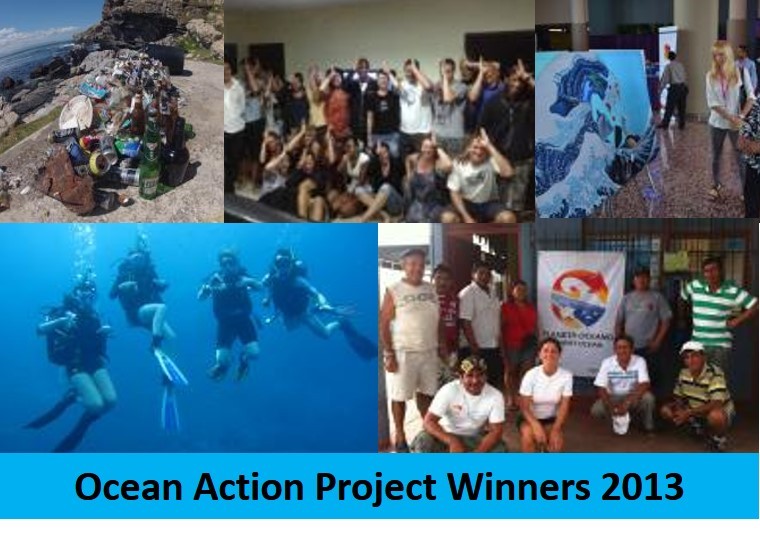Awesome Ocean Action Projects Inspiring Change

The grassroots Ocean Action Projects funded and voted on by you, the Project AWARE supporter, have had a fantastic year so far working with local communities to help bring us one step closer to a clean, healthy and abundant ocean planet. The Ocean Action Project winners have each been busy addressing the root causes of marine debris or shark and ray protection issues in their community. Here’s a little snapshot of what they’ve been up to.
Ecotourism and Awareness for Manta Ray Conservation, Planeta Oceano, Peru
Manta rays in Peru are under threat from continuous fishing pressure and have no national protection. Kerstin Forsberg and her team are working with local fishing communities to raise awareness about manta ray conservation and provide locals with an alternative source of income through ecotourism.
So far, the team have gained feedback and support from local community members and hosted workshops in multiple fishing communities around Peru. Working with the local fishermen has been pertinent to their project – educating them about the benefits of ecotourism and providing them with the tools to make the shift toward a more sustainable livelihood.
Protecting Sharks and Rays from Fishing Boats in the Andaman Sea, Blue Guru Conservation, Thailand
Blue Guru Conservation is committed to protecting the Andaman Sea’s threatened marine life. In 2012, the group recorded shark, ray and fishing boat sightings within Surin and Similan National Parks.
This season, they've expanded their research to include exclusive Koh Phra Thong sites, which include resident rays, turtles and a juvenile shark nursery. The results to date have been very promising from a conservation perspective. Shark sightings have increased from 12 to 27 percent, ray sightings increased from 8 to 10 percent over the past two dive seasons. Sadly, fishing boat sightings still far outnumber shark and ray sightings.
In addition to the shark and ray sightings, the team have also conducted surveys with National Park visitors as part of an effort to potentially expand no fishing zones in the future. The next step is to produce a persuasive report that can be shared with key Thai stakeholders and conservation allies with the aim to successfully protect shark and ray populations.
What Goes Around Comes Around - Communicating Marine Debris Science Through Visual Arts, The Plastic Ocean Project, USA
The traveling art exhibit, "What Goes Around, Comes Around", is an art initiative to visualize the problem of single use plastics and what can be done about it. The project collected plastics from nearly 10,000 nautical miles in three oceans, and the art consists of plastic items morphed into the famous print, "The Great Wave of Kanagawa" by Katsushika Hokusai, circa 1830. It systematically illustrates how the ocean is very different it was at the time of the painting 200 years ago.
Bonnie Monteleone and her team have been taking the art exhibit are on the road and have connected with more than 1000 people on the issue of plastic debris to date. When the exhibit was featured at a recent Jack Johnson concert in North Carolina, USA, Jack and his wife Kim invitied them to take the exhibit to Hawaii.
Thailand eShark Project, Shark Guardian, Thailand
The Thailand eShark Project gathers data, raises awareness, increases local community education and determines the best methods for the recovery and protection of shark populations in Thailand.
This season, over 4500 data entries were recorded, however shark sightings occurred in just 12.8 percent of them whilst rays were reported in just 14.8 percent of records. The black tip reef shark was by far the most sighted shark followed by the leopard shark and white tip reef shark. This data will now act as a baseline for data collected across subsequent seasons to help determine shark population patterns near Thailand. Building a comprehensive dataset is crucial to inform Thai Coastal Management and build a strong case for the urgent need of shark sanctuaries in Thailand.
In addition to the data reporting and analysis, Brendon and Liz have been taking their shark presentation on the road raising awareness about shark conservation and the need for greater protection measures for Thai waters.
This Project is Rubbish! South African Shark Conservancy, South Africa
In an effort to reduce marine litter, this project assesses the impact of macro- and micro- marine debris in the environment whilst also raising awareness in the community.
So far, the team have done over 30 sampling sessions, analyzing findings for both beaches in Hermanus, South Africa, that are regularly cleaned with beaches that are not. Currently, all the data is being entered into the database and the remaining samples are being weighed. The team has also integrated various events and projects to focus on community education including a sustainability road show, installing fishing line bins hosting coastal cleanups.
What's next? The team will begin to analyse the stomach contents of fish to assess the impact of micro-plastics in the environment and shallow water fishes.
Keep up-to-date with all the awesome Ocean Action Projects through their My Ocean profiles (links above).



